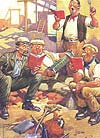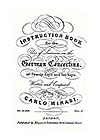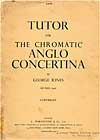|
Posted 15 August 2005
“Faking It”: a dozen examples
Roger Digby
The dozen musical examples below are
presented to accompany the web publication of the text of
“Faking It” by Roger Digby,
which is available in full at this site. [Link.]
Playing along with other musicians is an excellent way of learning and
practising, but many people don't have regular access to sessions. It's also
possible to go for ages without ever seeing another Anglo player. These
sound files are intended to help fill that gap. The tunes are printed
without chords and you will notice that there are six in C and six in G so
the most frequent Anglo keys are available.
Add the 3 chord trick in the way I have described and then try playing along
with my efforts. (Watch out for 'Greensleeves' (the Bacca Pipes Jig) which
is 'minor' in the A part and therefore the trick is different. I use the
occasional F chord in the A part which I think most purists would say is out
of place!
I have chosen tunes that are common in English sessions and include most of
the dance rhythms. They are not brilliant performances. Far from it! They
were recorded in a few short hours for use at a workshop which I gave at the
East Anglian Traditional Music Trust—an
excellent organisation that is
doing a lot for Traditional Music in my part of England. They are 'first
takes'—I only re-recorded if I made a complete dog's breakfast or the phone
rang! I do have 'practised items' which I use in performance, but session
tunes vary each time I play them and this is the joy of playing in that
context. It is relaxing and enjoyable. If you find you are not relaxing or
enjoying when playing along then take a break and come back later. I believe
that traditional musicians only ever played when they felt like it; we
should do the same.
Good luck with your playing. I hope these tunes are useful.
(The small photographs of major traditional singers and musicians, like the tunes themselves, are
from an event organized by the East Anglian Traditional Music Trust.
Thanks to Mark Bazeley, John Cocking, Bob Davenport, Hubert Freeman, Jeannie Harris, Reg Hall,
Tony Hall, Katie Howson, Ray Hubbard, Bill Murray, Will Noble, and Dan Quinn.)
-
 Tune 1: Dannish Waltz
Tune 1: Dannish Waltz
-
by Roger Digby
-
Audio file in WMA or MP3 format, time 2 mins 19 secs.
Musical arrangement in PDF format, 1 page.
-
Posted 15 August 2005
-
» listen to audio in WMA format
-
» listen to audio in MP3 format
-
» read/print arrangement in pdf
-
 Tune 2: Family Jig
Tune 2: Family Jig
-
by Roger Digby
-
Audio file in WMA or MP3 format, time 1 mins 53 secs.
Musical arrangement in PDF format, 1 page.
-
Posted 15 August 2005
-
» listen to audio in WMA format
-
» listen to audio in MP3 format
-
» read/print arrangement in pdf
-
 Tune 3: Greensleeves
Tune 3: Greensleeves
-
by Roger Digby
-
Audio file in WMA or MP3 format, time 1 mins 47 secs.
Musical arrangement in PDF format, 1 page.
-
Posted 15 August 2005
-
» listen to audio in WMA format
-
» listen to audio in MP3 format
-
» read/print arrangement in pdf
-
 Tune 4: Harry Cox’s Schottisch
Tune 4: Harry Cox’s Schottisch
-
by Roger Digby
-
Audio file in WMA or MP3 format, time 1 mins 56 secs.
Musical arrangement in PDF format, 1 page.
-
Posted 15 August 2005
-
» listen to audio in WMA format
-
» listen to audio in MP3 format
-
» read/print arrangement in pdf
-
 Tune 5: Man in the Moon
Tune 5: Man in the Moon
-
by Roger Digby
-
Audio file in WMA or MP3 format, time 2 mins 48 secs.
Musical arrangement in PDF format, 1 page.
-
Posted 15 August 2005
-
» listen to audio in WMA format
-
-
» listen to audio in MP3 format
-
» read/print arrangement in pdf
-
 Tune 6: Three Around Three
Tune 6: Three Around Three
-
by Roger Digby
-
Audio file in WMA or MP3 format, time 3 mins 01 secs.
Musical arrangement in PDF format, 1 page.
-
Posted 15 August 2005
-
» listen to audio in WMA format
-
» listen to audio in MP3 format
-
» read/print arrangement in pdf
-
 Tune 7: Blaydon Races
Tune 7: Blaydon Races
-
by Roger Digby
-
Audio file in WMA or MP3 format, time 2 mins 22 secs.
Musical arrangement in PDF format, 1 page.
-
Posted 15 August 2005
-
» listen to audio in WMA format
-
» listen to audio in MP3 format
-
» read/print arrangement in pdf
-
 Tune 8: Dorset Four Hand Reel
Tune 8: Dorset Four Hand Reel
-
by Roger Digby
-
Audio file in WMA or MP3 format, time 2 mins 51 secs.
Musical arrangement in PDF format, 1 page.
-
Posted 15 August 2005
-
» listen to audio in WMA format
-
» listen to audio in MP3 format
-
» read/print arrangement in pdf
-
 Tune 9: Galopede
Tune 9: Galopede
-
by Roger Digby
-
Audio file in WMA or MP3 format, time 3 mins 01 secs.
Musical arrangement in PDF format, 1 page.
-
Posted 15 August 2005
-
» listen to audio in WMA format
-
» listen to audio in MP3 format
-
» read/print arrangement in pdf
-
 Tune 10: Keel Row
Tune 10: Keel Row
-
by Roger Digby
-
Audio file in WMA or MP3 format, time 2 mins 14 secs.
Musical arrangement in PDF format, 1 page.
-
Posted 15 August 2005
-
» listen to audio in WMA format
-
» listen to audio in MP3 format
-
» read/print arrangement in pdf
-
 Tune 11: Shepton Mallet Hornpipe
Tune 11: Shepton Mallet Hornpipe
-
by Roger Digby
-
Audio file in WMA or MP3 format, time 2 mins 59 secs.
Musical arrangement in PDF format, 1 page.
-
Posted 15 August 2005
-
» listen to audio in WMA format
-
» listen to audio in MP3 format
-
» read/print arrangement in pdf
-
 Tune 12: Winster Gallop
Tune 12: Winster Gallop
-
by Roger Digby
-
Audio file in WMA or MP3 format, time 2 mins 50 secs.
Musical arrangement in PDF format, 1 page.
-
Posted 15 August 2005
-
» listen to audio in WMA format
-
» listen to audio in MP3 format
-
» read/print arrangement in pdf
Author
Roger Digby
(
)
has an academic background in the Classics and Education and he
has spent his entire adult life teaching in the tough Comprehensive schools
of Inner-London Islington. This random move in the early 70s found him
living 100 yards from Crabb’s Liverpool Rd. workshop, close to some pubs
where the Irish music was the best in London and joining the company of
friends who in 1975 became ‘Flowers and Frolics’, a band at the sharp end of
what has become known as the English Country Music revival. They released
two influential vinyl LPs before calling it a day in 1985. A reunion in 1999
created a CD
‘Reformed Characters’ (available at www.danquinn.co.uk).
With ‘Flowers’ as resident band, Roger joined with singer Bob Davenport to
run the music nights at the Empress of Russia, a legendary music club which
was famously described by Melody Maker as the ‘most adventurous acoustic
venue in the country’. Bob and Roger still work as a duo and have released two
CDs (www.topicdrift.com/davenport).
Roger's most recent recordings are
included in the three CD compilation ‘Anglo International’
(available at www.angloconcertina.co.uk).
Roger has now moved ‘back home’ to his native North-East Essex where he
reads, gardens, walks his dogs, brews beer and enjoys retirement. He is
the Review Editor of
Papers of the International Concertina Association (PICA).
Have feedback on this article?
Send it to the author.
Reprinted from the Concertina Library
http://www.concertina.com
© Copyright 2000– by Roger Digby
|

A concertina
and a copy of the tune
is all that’s needed.
Contents
This original version of the workshop
using these musical examples was given at
the East Anglian Traditional Music Trust.
© 2004–2005 Roger Digby
Audio Player Requirements

Links to related documents
-
 “Faking It”
“Faking It”
-
by Roger Digby
with a section on the Duet Concertina by Kurt Braun
-
Subtitled "A guide to selecting appropriate chords
on the Anglo and Duet Concertinas".
Explains how to play the concertina from a “fake book” or “busker’s book”,
which gives a melody line and an indication of the chords for accompaniment. 16pp.
Originally published for the ICA, 2004.
-
Posted 15 August 2005
-
» read full document
-
 Anglo File
Anglo File
-
by Roger Digby
-
There is insufficient evidence to address the question, ‘Is
there a traditional English style of Anglo playing?’ The situation might
have been different if Kilroy, Kimber and Tester had more in common, but
they don’t. What these three do have in common is the way that their playing
reflects their background and context.
Originally published in English Dance and Song
(magazine of EFDSS, the English Folk Dance and Song Society),
vol. 64, no. 2 (Summer 2002), 6–7.
-
Posted 15 August 2005
-
» read full article
-
 Earliest Known English-Language German Concertina Tutor: Minasi’s “Instruction Book” 1846
Earliest Known English-Language German Concertina Tutor: Minasi’s “Instruction Book” 1846
- by Randall C. Merris and Dan Worrall
-
Carlo Minasi published the earliest known English-language tutor for the German ("Anglo-German") concertina
by 1846 in London.
This publication goes well beyond the basics; in it are instructions not only
for the simple “along the row” melody line style, but also extensive discussions of octave
playing, cross row fingering, and chord accompaniment.
Numerous fully arranged musical selections are included,
almost all in the “English” or “harmonic” style, where chords are played on the
left and melody on the right, more or less as a duet concertina is played.
- Posted 15 August 2005
- » read full article
|


















